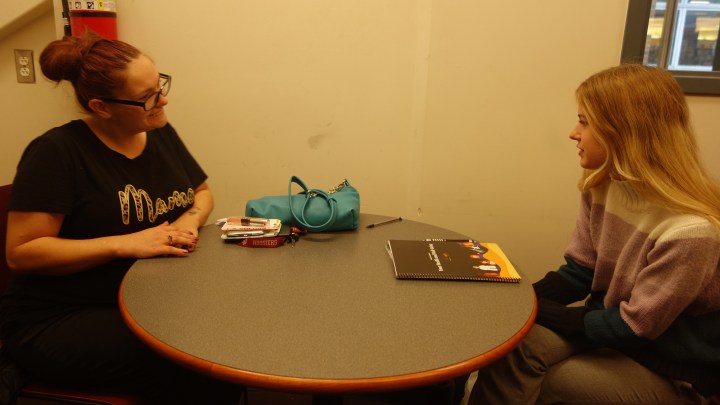
Indiana group helps mothers recently released from prison find housing and jobs
Indiana group helps mothers recently released from prison find housing and jobs

It’s been nearly a year since Savannah May was released from the Indiana Women’s Prison, and she’s looking for a job.
She applied to one store, she said, and “then I applied to another store, and because of my background, I didn’t get it.”
May was sitting in an overheated room at the Indianapolis library, talking to Ashley Mager, the project coordinator for Mothers on the Rise — a program for mothers who are coming out of prison.
These women often have to start over from the ground up: A criminal record can complicate basic things, like finding a job or renting an apartment. For mothers coming out of prison, there are often added challenges, like finding child care and buying formula they can afford. Mothers on the Rise is trying to make it easier for these women and their children.
“Do you want help looking?” Mager asked. “Maybe I can call places and ask.”
“I would like something in the mornings,” May responded. “And then I need something that is felon-friendly and misdemeanor-theft friendly.”
Mothers on the Rise was developed through a project at Indiana University. It was designed to build a kind of support network to keep women from going back to prison and help them thrive on the outside. The network includes a social worker, a nurse practitioner and a law school clinic — also through Indiana University — that provides legal support. There are community navigators in each area where women live who can direct them to local services like food pantries.
One of those navigators is Nina Porter, who was released from the Indiana Women’s Prison a decade ago. At the time, she promised herself she would never go back.
“I spent most of my adult life in there,” she said. “Time after time, coming back pregnant. I kept saying that there had to be more to life than this.”
Now, though, she’s at the facility all the time, where she draws on her own experiences as a formerly incarcerated mother to help other women. “I let [the incarcerated mothers] know that when I come in, I’m still learning. And I understand.”
To be most effective, Porter said the support system should be in place before a woman needs it, which — for Mager and Porter and the rest of the team — means making connections with women while they’re still incarcerated.
“We want to be established there so that we are there and it’s up and running,” Porter said. That way, “no matter what else is going on, we can catch at least the majority of people being released.”
Because of the way Indiana’s sentencing rules work, women are sometimes released with little or no warning.
“We want to have touched base with them and get to know their individual needs,” Porter said.
Many of those individual needs come back to complicated financial circumstances, said Emily Salisbury, director of the Utah Criminal Justice Center at the University of Utah and an associate professor of social work.
“Many women are single mothers,” she said. “Many women, of course, also are struggling to find a livable wage and social support to be able to handle some of the daily things that certainly justice-involved women have to navigate,” like probation or parole.
For Savannah May, those complicated pieces include a new baby, a landlord who wouldn’t fix the heat and only being able to afford ultracheap diapers that gave her toddler a rash.
Mothers on the Rise is funded through grants and donations, which means it can pay for some things, like better diapers.
But Mager said the real point of the program is to show the women how to eventually help themselves. “It empowers them, and they can create agency and like then they did solve the issue themselves if they work with this agency and get these resources,” she said.
Mothers on the Rise is hoping to expand to other states as soon as it can secure more funding.
There’s a lot happening in the world. Through it all, Marketplace is here for you.
You rely on Marketplace to break down the world’s events and tell you how it affects you in a fact-based, approachable way. We rely on your financial support to keep making that possible.
Your donation today powers the independent journalism that you rely on. For just $5/month, you can help sustain Marketplace so we can keep reporting on the things that matter to you.

















